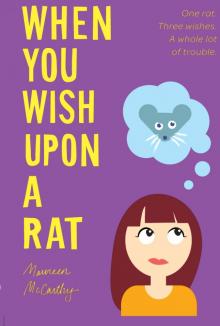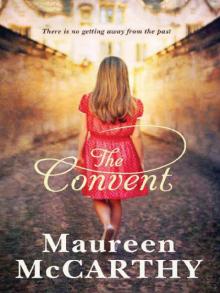- Home
- Maureen McCarthy
Queen Kat, Carmel and St Jude Get a Life Page 20
Queen Kat, Carmel and St Jude Get a Life Read online
Page 20
Katerina shook her head in amazement. I could see that underneath she was disapproving, scathing even, of the whole idea of Carmel going with an old friend of her family. But she wasn’t going to risk saying so after being pulled up short only minutes before.
‘Well, that’s nice,’ she said feebly, putting her cup down. ‘Look, I’ve got to go. Good luck with the . . . er, rehearsal, Carmel. I hope you get a spot or whatever it is you want. And, er . . . say hello to Anton for me, will you?’
‘Yes, I will. Thanks.’
When we heard the front door slam, Carmel gave a deep groan. ‘Oh God! She makes me feel terrible! What are you grinning about, Jude?’
‘Carmel,’ I replied. ‘I think we made another crack in that icy wall.’
‘What do you mean?’
‘She’ll think twice about stepping on your toes again!’
‘But did you see how she reacted to me and Anton?’
‘So what?’
‘She thinks he’s my boyfriend!’
‘Well, he is, isn’t he?’ I said quickly, surprised.
‘Oh, Jude, I don’t know . . .’ Carmel’s face was bright pink, ‘I think we’re just good friends. We both love music and . . .’
‘Come on, Carmel,’ I teased, ‘you’re more than just good friends . . . aren’t you?’
She got up from the table frowning unhappily, and began stacking up the dishes.
‘What should I wear to this thing this afternoon, Jude?’ she asked, abruptly changing the subject. ‘I don’t want to look ridiculous.’
‘You won’t, Carmel,’ I said, longing for her to tell me more about her relationship with Anton, but knowing that I mustn’t intrude. ‘You always look beautiful.’
She gave a heavy sigh. She had her back to me, staring out the window, filling the sink with water.
As far as I could tell, Carmel was seeing quite a lot of Anton during the afternoons and on the weekends. But I couldn’t work out quite what was happening with them. What I did understand after we’d been back from Manella a couple of weeks was that it was the most delicate of relationships; one I didn’t feel right about questioning. I had simply thought that within a couple of weeks I’d wake up and find him in the kitchen after having spent the night in Carmel’s bed. But not so. They seemed to go out together in an old-fashioned way. Sometimes, if I got out early from my lectures, I’d arrive home in the late afternoon. Carmel and Anton would be there, sitting at different ends of the lounge room eating bread rolls and drinking cups of tea and listening to music. I used to wonder if they’d been to bed together before I got there, but my gut feeling told me that this wasn’t the case. There was no real easiness between them, just this nervous kind of tenderness.
After my outburst to her mother I was determined not to intrude. Could they have decided just to be friends? That, I knew, would be terrible for Carmel because she was madly in love with him. Perhaps he was involved with someone else and was holding Carmel at bay until he’d finished it with her? I watched and waited, all ears and eyes, sure that I’d pick up what was happening sooner or later.
Once the three of us went to a party together. There was a big crowd bunched up in a tiny space drinking cask wine and eating lumps of horrible cheese and stale salami. The very loud music made talking impossible. I didn’t like those kinds of parties very much. They made me long for my Chilean friends, for the life we had in the cafe, with Juan and the others, where all the ghosts of the dead and disappeared were just as important as those who were physically there. But when the dancing started, and Anton and Carmel took to the floor, my fears about them vanished. They were definitely in love. The way he looked into her eyes and laughed. At one point they kissed lightly. I looked around and saw that everyone in the room had seen that kiss. The handsome young man and the plump girl smiling at each other, oblivious of everyone else. Mesmerising.
When it was over we went home together; the three of us squashed into the front seat of Anton’s little Renault. Carmel was sitting in the middle. We talked about nothing much. Anton was very quiet, but not aloof. He joined in every now and again with a short comment or a laugh. As soon as I got inside the door I said goodnight and disappeared into my room, pleased to think that my fears about them were groundless. I lay in bed thinking that if it hadn’t happened before, tonight would be the night.
Then I heard footsteps coming back down the hallway, and muttered farewells outside the front door. Damn it! Why was he going? I was filled with an impatience that made sleep impossible. I got up as soon as I heard his car drive off, pretending to get a drink of water. But Carmel didn’t appear. She must have gone straight to her room without using the bathroom. I waited a few more minutes, puzzled, then decided to pull back. After all, the relationship wasn’t mine.
It must have been some hours later when I woke to find Carmel sitting on my bed shaking me.
‘Come on, Jude!’ she demanded. ‘Wake up! You’ve had a bad dream. Please. Come on, wake up!’ I rubbed my eyes, amazed to find that my face was hot, and wet with tears.
‘My God,’ I said. ‘I didn’t know anyone cried in their sleep, did you?’
‘Thank God you’re awake,’ Carmel said and switched on the light. ‘You were really shouting out and crying, Jude.’ Her worried face peered into my own. ‘What were you dreaming about? You were so hard to wake!’
‘Why don’t you sleep with him?’ I asked suddenly, too disoriented to remember my former resolve not to pry.
‘What?’
‘Anton,’ I said. ‘Why don’t you sleep with him?’
‘I want to! I really do,’ she said, laughing a little.
‘Then why didn’t he stay tonight?’ I persisted.
‘Because . . . O h, Jude, come on! Let’s go and get a drink. We’ll talk about Anton later. Tell me what you were dreaming about. If you talk about it you won’t have to dream it again. That’s what they say, anyway.’
Carmel put a cup of hot milky cocoa in front of me. It was nearly four in the morning and the kitchen had warmed up with the radiator on full blast. We’d been quiet for a while, with me just sitting there staring into space, wondering about Carmel and Anton, and about this terrible spate of dreams I’d been having, while she bustled around getting the cups and heating the milk.
‘Was it your father again?’ she probed gently.
I nodded and began to speak, trying to fit my dream into a context – for myself, as much as for her.
‘After 1972, when Allende had been voted in a second time, the right-wing forces in the country couldn’t take it. They knew then that they couldn’t get the power back democratically, so they decided to pull off the gloves . . .’
‘How do you mean?’ Carmel cut in, frowning. ‘Pulled the gloves off? What does that mean?’
‘Well, since 1970 there was this deliberate behind-the-scenes policy of destabilisation. They fought really dirty, making up all kinds of lies about Allende, about his government, anything they could think of to bring him down. But none of it worked. The Popular Unity government got in again with an increased majority in 1972. So the right-wing forces decided to get really nasty. With help from the United States of course. Nixon and the CIA . . .’ I added bitterly. ‘It was deliberate. They couldn’t bear for this popular government to work . . .’
Carmel nodded. I had no idea if she understood anything I was saying. But I was beyond caring. I somehow needed to say all this stuff; go over the snippets of history I knew. Speak them. Try and understand it all over again.
‘They began to orchestrate strikes. Chile is such a long difficult country geographically. Depends absolutely on its transport system – the roads and trains – to get the supplies of food and materials into the cities, towns and out into the countryside. First, the truck drivers went on strike. They were paid by God knows who – the Americans, everyone says – not to work, so of course they didn’t. Everything began to grind to a halt. Supplies of basic items became spasmodic. Strikes broke out everywhe
re. My mother says it was terrible. First there was no meat, then no cloth to make clothes, and then the supply of fruit and vegetables dried up. Then beans, chilli, chocolate. The kerosene that people used for their heating and cooking. You name it . . . one by one.
‘But the people fought back. They knew what was going on. They knew that the right wing was deliberately creating chaos. So all kinds of people – factory-workers, singers, teachers, doctors, university professors, housewives – joined work units. They knew that everything they’d worked for over the previous few years was being threatened. They became truck drivers and fruit sellers in their spare time. My mother was in charge of a unit of housewives whose job it was to guard the local shops from sabotage. Basic goods like coffee and beans were being bought up in bulk by factions in the army and the right-wing forces, and either sold on the black market for exorbitant prices or stored for when “order” was reestablished. Sometimes these supplies were actually thrown away. Into the rivers or into deep pits . . . Can you believe that? They destroyed food when people were hungry. One day there would be coffee and beans in a local shop, the next day none. My mother organised women to stand outside the shops to watch for the smuggling of bulk goods; and just by being there they helped stop many of the most blatant abuses by insisting that only locals could buy basic goods from local shops. You see, it was all being organised covertly. The army and the right wing made out that people were mad even to suggest that this was going on. They wanted the people to blame Allende and his government for the shortages . . .’
Carmel was staring at me. Her eyes wide, like a child listening to an incredible story.
‘Then they began to kill people,’ I went on bluntly. ‘Not only radicals or socialists, but their own people, too. A few generals in the army who happened to believe in democracy were murdered. Rumours began to circulate. Fear spread in the streets. Mum said it was sort of like a fog. It came in slowly, low and deadly, like a poisonous cloud. The people who’d voted Allende in kept working, refusing to give up their dream. But the ground was being prepared right in front of their eyes. People knew the coup was coming, but they had no idea it would be so cruel, or so vicious.
‘Medical supplies, you know, basic drugs, bandages and equipment, began to disappear from the hospital where my father worked. Replacements never arrived. Everyone knew that they were being stolen, but no one was game to say so. People were too frightened to step out of line. Meanwhile patients in the hospital were dying. Medicines that had been available only the week before became suddenly impossible to get.
‘The second time they picked up my father he and another young doctor from the hospital were stealing back a stash of medical supplies that had been stolen only the week before. So, you see, they had a real reason to put him in gaol then. He was caught stealing. The fact that it was for the hospital and had been stolen in the first place didn’t matter. My father was one of only half a dozen doctors who had refused to go on strike at this time. He was blacklisted and threatened, even though he was only doing his job. People were dying all over the place for want of the most simple medical procedures. The right-wing forces just wanted their own people back in power, they didn’t care what had to happen, so long as that took place. Most of the other doctors, and the staff in the hospital, were too afraid to keep working and they tried to make my father feel afraid, too.’
I stopped, exhausted.
‘You don’t want to know all this, Carmel,’ I whispered. ‘I mean, what has it got to do with anything . . . I ’m sorry . . .I keep burdening you with my dreams . . .’
‘Yes, I do,’ she said quickly. ‘I want to know.’
‘Well, in my dream I was watching my father stealing back the medical supplies, in just the way my mother has described it happening. He and his friend had hired a van and a driver. They’d found the site and were busy packing the boxes into the van when they were caught. Red-handed.
‘At the same time as being able to see my father packing the van, I could also see the carbiñeros heading out along the street towards the empty warehouse. It was packed with police, laughing together. They’d been tipped off. Maybe even set the whole operation up. Who knows? They all had . . .’ Here my voice cracked. ‘They had painted faces. Grotesque masks. It was like a film, Carmel, cutting back and forth between the two. My father trying to steal back the supplies for the hospital and this truck of laughing men with painted faces. I was trying to warn him, but I knew he was doomed. I knew what was going to happen.’
I gasped, shivering as tears filled my eyes. Carmel reached out across the table. I took a couple of deep breaths and tried to calm myself.
‘It must all have been such a bitter disappointment when hopes ran so high,’ she said.
‘But why am I dreaming about this stuff? I don’t think about these things during the day. I mean, I know what happened. I don’t need to think about it any more.’ Carmel opened her mouth to reply, but closed it again without speaking. We both heard the key in the front door and the quick footsteps making their way towards the kitchen.
The door flew open and Katerina, face set in an irate frown, burst in. When she saw us, she gave a small gasp of surprise and quickly rearranged her expression to one of polite curiosity.
‘Oh, hello,’ she said. When she noticed my splotchy tearstained cheeks her expression changed again to one of concern. ‘What . . .
what is the matter, Jude?’ I suppose we did look a bit odd. Carmel had moved around to my side of the table and her arm was still around my shoulders. I shrugged.
‘Oh nothing . . .’ I said, not really wanting to explain, to her of all people. ‘I’ve been having bad dreams, that’s all . . .’
‘What about?’ she asked in quite a kind, neutral voice, putting one elbow on the table and resting her chin in her hand.
‘All about my father in . . . Chile.’
‘Do you remember your father?’ she asked.
I nodded, embarrassed. ‘My mother tells me that I was only two when he died, so it’s almost impossible that I can. But I seem to . . .I.. . . know I can remember him.’
‘No,’ she said emphatically, as if she knew all about it. ‘It’s not impossible, some people can remember that far back. What kind of things do you remember?’
‘Not a lot. I can remember some events. Like sitting on his shoulders in a protest march . . .’ My voice petered out. ‘Things like that. But my mother said I wasn’t even born then, so . . .’ I shrugged and looked at Carmel.
‘God, how fascinating,’ Katerina said seriously. I looked up and saw that she genuinely was fascinated. I smiled.
‘Yeah,’ I said. ‘Crazy isn’t it?’
‘Not crazy, Jude,’ she said suddenly. ‘Interesting and . . . it means you are a person with deep insight.’
I smiled shaking my head a little. ‘I.. . . don’t know about that.’ Deep insight? A laugh rose in my throat. The phrase sounded hilarious coming from Katerina.
The three of us were silent for a while. Quiet night sounds began to invade the room. The low buzz of the fridge, the wind outside. I began to think of my mother. The way she spoke and her white hands. I was aware of a feeling of deep anxiety for her. I realised that I was angry with her, too, but I didn’t know why.
Why did the DINA let her go? They killed others, even others with international passports like her. She’d been taken in and questioned for days. But then they’d let her go. What had she told them? Why won’t she talk about that time? All through my life she has told me about my father, never about her own experiences. Why does Juan always give me that glazed look when my mother is mentioned?
‘What have you been doing?’ I asked Katerina suddenly. She flinched slightly.
‘Oh, nothing much. You wouldn’t want to know. A bit of a bad dream, you could say.’ She gave a hard little laugh and Carmel and I looked at her in surprise.
‘Why?’
‘Oh, just the usual boyfriend trouble,’ she shrugged. ‘You know, the ones who th
ink they own you?’ Carmel and I didn’t answer. Her worldliness was disconcerting.
‘Is it Glen?’ Carmel asked softly. Katerina laughed.
‘Oh God, no!’ she leant forward conspiratorially. ‘You two were dead right about him. He’s a real creep! And I didn’t see it for ages.’
‘Told you so!’ I joked, wagging my finger at her.
‘You did, too,’ Katerina laughed.
‘We aren’t just pretty faces,’ I added drily. ‘You want advice on your love life, come to us!’ Katerina laughed again good-humouredly and I couldn’t help thinking that maybe we’d misjudged her all along. At four on this Saturday morning she suddenly seemed like a rather nice person.
‘It’s this other guy I’ve met,’ she said, looking down at the table, a little embarrassed. ‘The one who has the contact with Vogue. Jordan. He’s a photographer. Wants me to pose for a pinup calendar.’ She giggled. ‘You know, one of those tits and bums things?’ Our mouths must have fallen open in surprise because she went on hurriedly, ‘Sexy, but . . . tasteful, you know? Nothing . . . too . . . well . . . not pornography, just . . .’ She looked up at Carmel, whose face had tightened, distaste plastered all over it.
‘Something wrong, Carmel?’ Katerina snapped. Carmel shrugged with embarrassment.
‘Oh . . . no,’ she stuttered. ‘Just, er . . . surprised.’ Katerina turned back to me.
‘Just raunchy, you know?’ she said, somehow wanting my approval.
I nodded.
‘When I said I wanted to think about it,’ Katerina went on blithely, ‘Jordan was furious . . . How could I possibly think of turning down this enormous opportunity to be the next Elle Macpherson, blah, blah. And then the guy I’m going with, Conner, got furious because I was even considering doing it. How could you possibly think of taking your clothes off for everyone to see, blah, blah . . . So I left the nightclub tonight with both of them huffy . . .’
‘How old is he?’ Carmel asked suddenly in a low voice. Katerina smiled coyly.

 Careful What You Wish For
Careful What You Wish For When You Wish upon a Rat
When You Wish upon a Rat The Convent
The Convent Queen Kat, Carmel and St Jude Get a Life
Queen Kat, Carmel and St Jude Get a Life Rose by Any Other Name
Rose by Any Other Name